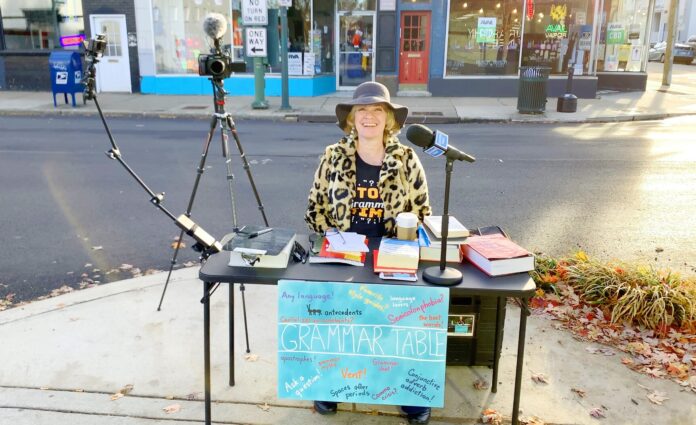Reality: We’re at a juncture where more people than usual seem to be dangerously out of touch with it, while others wish it weren’t staring them in the face. There’s a lot of bad news out there that is important to be aware of, though you might also feel you’re suffering from overexposure to it already. Escapism beckons.
That might seem to work against the timing of DocFest, aka, the San Francisco Documentary Film Festival, whose 24th edition runs this Thu/29 through June 8. But as ever, this longest-running offshoot of SF Indiefest casts a wide net, well beyond the usual nonfiction cinema realms of current events and politics. You’ll certainly find some of the latter in its 2025 program… but also everything from Afghani song and ecological kayak-tivism to bathing beauties and Qatari street cats. The festival will play in-person at SF’s Roxie and Vogue theaters, as well as via on-demand streaming.
The opening night features this Thursday evening both focus on women who’ve found singular paths to kicking against the, er, pricks. Brandt Johnson’s Rebel With a Clause is about his spouse, Ellen Jovin. Called “the Ann Landers of grammar,” she has set up a table at coast to coast locations to answer people’s questions about language—which tends to open up a lot of dialogue about identity, culture, and what unites as well as divides us. Marie Losier’s Peaches Goes Bananas draws on footage she’s been shooting for two decades of the Toronto-born, Europe-based electroclash artist whose reliably outrageous, inventive work was pushing the boundaries of gender expression well before that became, you know, an enemy of the state.
Speaking of boundary-pushing, the “Centerpiece” selection No Bad Takes: An American Picture Show With William T. Vollman on Sat/31 finds director Greg Roden stubbornly trying to get into the head of that notable novelist-journalist, who has lived in San Francisco and now apparently calls Sacramento home. He lets his camera-wielding observer follow (or frequently drive) him around the country, frequently in search of “outsiders” to interview for research, including homeless populations in Las Vegas, Bakersfield, and the Delta region. But he finds Vollman “didn’t want to be my subject, he wanted to be my friend,” frustrating his attempts to tunnel inside the mind of this famously edgy scribe. Strangely, Roden’s complaints aren’t really shared by the viewer: Vollman may strike him as elusive, but to us, he couldn’t seem more pleasant and unpretentious company for 100 structureless-yet-engaging minutes.
Other DocFest features showing creativity at work include Wendy Lobel’s Anxiety Club, in which a number of successful stand-up comedians discuss their relationships to mental health (or its lack); Magda Wyszynska’s Gamemaster, about the Danish inventor of a unique role-playing game; Sue Carpenter’s 40 Watts From Nowhere, chronicling the short but influential life of late 1990s Los Angeles pirate radio station KBLT; and Sam Javadi’s Mahwash, named after the legendary “voice of Afghanistan” whose career was always in conflict with religious fundamentalists, even before they forced her into exile. (Now nearly 80, she lives in Fremont.) Charles Shakleton’s Zodiac Killer Project is a dissection-projection of the true-crime documentary he expected to make—only to get its plug pulled. So instead, he made a movie not so much about the infamous Bay Area crime spree, but about the burgeoning true-crime-documentary genre itself, and the many filmic cliches it has evolved.
Ranging elsewhere around the globe, Trisha Ziff’s Gerry Adams: A Ballymurphy Man profiles the controversial Irish independence leader, while Jayson McNamara & Andrea Tortonese’s Norita (which counts Jane Fonda among its producers) does likewise for a leading light in Argentina’s Mothers of the Plaza de Mayo movement. Ligia Viovana Cortes Aguila’s Sketches on the Sky utilizes animation and other elements to illustrate legends and customs being preserved from pre-Hispanic life around El Tajin in southern Mexico. Andy Mundy-Castle’s Shoot the People follows activist photographer Misan Harriman from country to country as he documents social justice movements. On a more tranquil note, Alain Wirth’s A Taste for Things charts the efforts of two fledgling Swiss organic farmers—though tranquility becomes scarcer once a road bordering their property becomes a major construction site.
If it’s character of a non-human type you’re after, that too is represented internationally. 25 Cats From Qatar from Cat Daddies director Mye Hoang sees a feral feline crisis in Dohar addressed by having some strays flown to Wisconsin for adoption. (I doubt they used the luxury jumbo jet recently “gifted” to our POTUS by that nation.) Adam Irving’s The Last Hounds weighs the conflict between those invested in the 100-year-old sport of greyhound racing in Kansas and Iowa versus animal rights groups decrying it as inhumane. Alaifu’s The Last Mongolian Horseman scrutinizes another vanishing livelihood, that of nomadic herding families being pushed out of their traditional grasslands by industrialization.
As ever, flamboyant and eccentric individuality is celebrated at SF DocFest. Fil Ieropoulos’ Avant-Drag! showcases ten drag artists who use their performance personas not simply for entertainment, but in the service of politicized public protest against various forms of oppression. A community of young LGBTQ+ people forms in a desert squatter town near the Salton Sea called Flamingo Camp, but Chris Coats’ documentary of the same name finds that safe space challenged by internal strife and external adversity.
It is not to be confused with Adam Sekuler’s The Flamingo charts one 60-something woman’s quest to make up for lost time via a headlong dive into BDSM practice and other pleasures. Daniel Claridge & Pacho Velez’s They’re Here finds a similar “human quest for connection” in pockets of believers in UFO sightings and visitations, while Sean Dunne’s Wild Magic provides a “kaleidoscopic road trip through modern mystical Americana.” Elijah Sullivan’s The Hole Story provides an oddly lyrical probe into the mystery of a sixty-foot crater found dug on Mount Shasta, as well as the history of secretive cult beliefs it turns out to be tied to.
If it’s more explicitly up-to-the-moment sociopolitical inquiry you’re after, fear not: There are features about the ever-hot topic of U.S. racial justice (Selina Lewis Davidson & Macky Alston’s Acts of Reparation), the right to die (Reid Davenport’s Life After), the cryptocurrency industry (Alyssa Fedele & Zachary Fink’s Any Problem Is No Problem), and housing insecurity (Erica Jordan’s Looking for My Anchor finds her forced out of an SF home into a fragile Sausalito houseboat community).

In addition to the aforementioned Anxiety Club, an official closing-night selection is Jill Campbell’s Beyond the Gaze, about Jule Campbell, the longtime driving force behind the Sports Illustrated Swimsuit Issue—by some estimates “the most successful magazine in publishing history.”
Made by daughter Jill, the film sees her 90-something mother recalling the annual issue’s huge popularity after its 1964 debut (SI had never turned a profit in its prior decade of existence), the controversies it stirred, and her own frequently exasperating dealings with nearly all-male staff who undervalued her work even as they greatly profited from it. The lowest-paid senior editor, she was eventually shitcanned from that post after over 30 years’ loyal service, the excuse given simply that it was “time for a change.”
Almost from the start, the issue attracted criticism for being exploitative cheesecake, though Campbell insisted she sought images that might be “sexy” but not “lewd,” and tended to show models in active, athletic contexts rather than glammed-up ones. (She even claimed to eschew hair and makeup personnel to that end, though this is a little hard to believe.) Particularly once the feminist movement rose to a visibility peak in the 1970s, she stood accused of “marketing women, turning them into an object,” as one ex-model put it.
But most of the famous camera subjects here—Kathy Ireland, Cheryl Tiegs, Elle MacPherson, Tyra Banks, Paulina Porizkova, and Christie Brinkley are among those interviewed—regarded her as an ally. To them, she exemplified “women who support women,” as opposed to the pawing and leering they experienced elsewhere in the fashion industry. Campbell also pushed for broader photographic representation, including non-white faces, Olympic and pro female athletes, plus famous talents from other disciplines.
The above just covers the feature-film programming in DocFest. There are also nearly 60 shorts, many of them with a local origin or focus—like Les Blank’s Motorcycle Moment (which son Harrod edited from footage shot and abandoned by the late director over sixty years ago) and Peter Thomas Ruocco’s Taken For A Ride: How San Francisco Backstabbed a Generation of Cab Drivers.
There’s also an evening of “Staff Picks from the Prelinger Archives,” featuring live discussion of that local institution’s preservation efforts, and (at 11 am on Sat/31) the panel “Film Festivals, What Are They Good For,” with local fest programmers talking about their still-valued if imperiled professional terrain. Much of the festival will also be accessible for streaming on-demand, with live filmmaker Q&A’s archived when available.
24TH SAN FRANCISCO DOCFEST runs Thu/29-June 8. Showings primarily held at Roxie and Vogue Theaters, SF. Virtual festival available for home viewing. More info here, tickets here.






